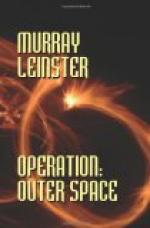“Johnny’s out with a gun. He’s hunting. I don’t like to be with Johnny when he may be disappointed.”
She smiled, and Holden sourly went away. There had been no particular consequences of Johnny Simms’ inability to remember what was right and what was wrong. But Holden felt like a normal man about men whose wives look patient. Even psychiatrists feel that it is somehow disreputable to illtreat a woman who doesn’t fight back. This attitude is instinctive. It is what is called the fine, deep-rooted impulse to chivalry which is one of the prides of modern culture.
Holden settled dourly down at the communicator to get an outgoing call to Earth, when there were some hundreds of incoming calls backed up. By sheer obstinacy and bad manners he made it. He got a connection to a hospital where he was known, and he talked to its bacteriologist. The bacteriologist was competent, but not yet famous. With Holden giving honest guesses at the color of the sunlight, and its probable ultra-violet content, and with careful estimates of the exactness with which burning vegetation here smelled like Earth-plants, they arrived at imprecise but common sense conclusions. Of the hundreds of thousands of possible organic compounds, only so many actually took part in the life-processes of creatures on Earth. Yet there were hundreds of thousands of species prepared to make use of anything usable. If the sunlight and temperature of the two worlds were similar, it was somewhat more than likely that the same chemical compounds would be used by living things on both. So that there could be micro-organisms on the new planet which could be harmful. But on the other hand, either they would be familiar in the toxins they produced—and human bodies could resist them—or else they would be new compounds to which humans would react allergically. Basically, then, if anybody on the ship developed hives, they had reason to be frightened. But so long as nobody sneezed or broke out in welts, their lives were probably safe.
This comforting conclusion took a long time to work out. Meanwhile Babs and Cochrane had swung down to the ground and went hiking. Cochrane was armed as before, though he had no experience as a marksman. In television shows he had directed the firing of weapons shooting blank charges—cut to a minimum so they wouldn’t blast the mikes. He knew what motions to go through, but nothing else.
They did not explore in the same direction as their first excursion. The ship was to take off presently, as soon as this planet had turned enough for the space-ship’s nose to point nearly in the direction of their next target. They had two hours for exploration.
They came upon something which lay still across their path, like a great serpent. Cochrane looked at it startledly. Then he saw that the round, glistening seeming snake was fastened to the ground by rootlets. It was a plant which grew like a creeper, absorbing nourishment from a vast root-area. Somewhere, no doubt, it would rear upward and spread out leaves to absorb the sun’s light. It used, in a way, the principle of those lateral wells which in dry climates gather water too scarce to collect in merely vertical holes.




